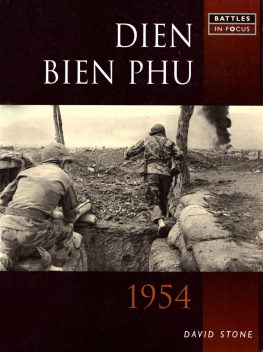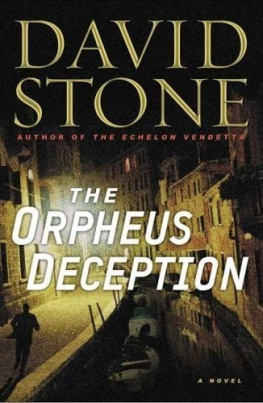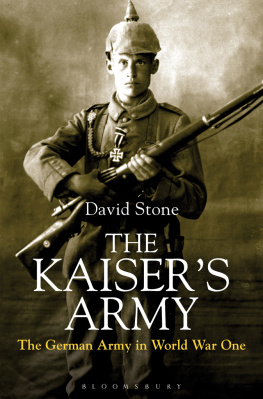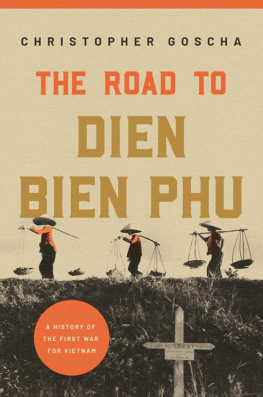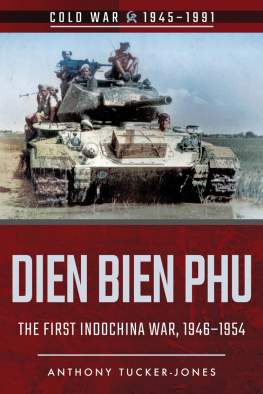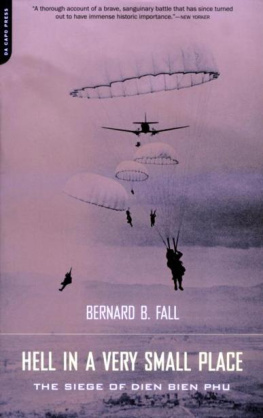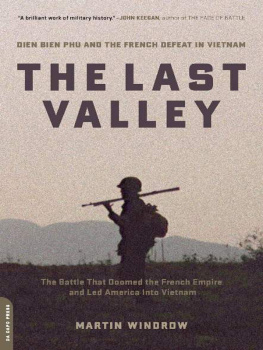BATTLES IN FOCUS
DIEN BIEN PHU
Dien Bien Phu Valley, viewed from the high ground in early 1954.
BATTLES IN FOCUS
DIEN BIEN PHU
DAVID STONE
CONTENTS
AUTHORS NOTE
A number of accounts both in French and in English of the Battle of Dien Bien Phu are available today. Some of these deal with specific aspects of the battle in considerable detail, others with the battle in its entirety. Several mention the battle incidentally, within wider histories of the French army units involved especially those of the French Foreign Legion or the French paratroops. Dien Bien Phu has also featured at various levels of detail in a number of general books on post-1945 military history. In addition, the many lessons of this battle have been analysed in the military staff training publications of several armies. Despite the existence of such a wealth of information, in the course of researching this book it became increasingly clear that there were in some cases factual discrepancies between these often diverse accounts particularly where weapon and equipment holdings, force levels and organisations, and statistical summaries were concerned; but also between their differing descriptions of the actions of some individuals and units (especially below battalion-level).
Consequently, in this account of the Battle of Dien Bien Phu, the subject has been approached in two ways. First, apart from a few essential exceptions, it concentrates on the French Union side of the conflict at battalion-level or above, and on the communist Viet Minh (or the Peoples Army of Vietnam) forces generally at army and division-level. Second, this work attempts through research and (in a very few cases) the application of a measure of professional military judgement to rationalise and resolve the more important factual inconsistencies identified in some other accounts. Therefore, it is postulated that the resultant work is an accurate and authoritative account of all the key elements of the battle of Dien Bien Phu, together with a new perspective on many of the events and decisions that surrounded and influenced the course of this remarkable clash of arms a defining moment in French and Vietnamese history, and unquestionably one of the most important battles of the Cold War era.
Finally, my particular thanks to Colonel (Retired) Nigel Flower, a long-term friend and a former colleague in the world of military intelligence. The final text of this work has benefited enormously from his positive suggestions and critical comments; but especially from the uniquely authoritative nature of these, consequent upon his special knowledge of Indo-China due to his assignment in former times as the UK Military Attach in Vientiane, Laos, at the height of Americas war in Vietnam.
INTRODUCTION
In mid-1966, I was serving on a short attachment to the 11e Bataillon de Chasseurs Alpins (the French Armys light infantry mountain warfare specialists). The battalion was stationed in the sleepy little town of Barcelonette in the Bas-Alpes. En route to Barcelonette I had spent a few days in the capital, where Paris was still showing signs of the earlier turmoil that had engulfed part of the French army. Only five years before, following what many viewed as the betrayal of the French army by General de Gaulle and the Paris government over its abandonment of Algeria, elements of the French Foreign Legion had mutinied, together with some other lite units and individuals. The Legions principal combat unit the 1er Rgiment tranger de Parachutistes (1 REP) had been disbanded, and the political reliability of a large element in the Legion and paratroop regiments remained uncertain in the eyes of the government. Elsewhere, strong undercurrents of political and national uncertainty persisted. Indeed, in 1966, in a mood of continuing paranoia in metropolitan France, several public buildings in Paris retained the rooftop machine-gun positions set up some five or six years earlier to counter an anticipated coup. But in Barcelonette such heady matters seemed far removed from the daily life of the Chasseurs Alpins in the picturesque French alpine region.
Then, one evening in the sous-officiers mess I encountered an adjudant-chef (senior warrant officer) whose three or four rows of medal ribbons, together with the paratroopers qualification wings on his chest and the green and gold fourragre of the Mdaille Militaire at his shoulder, indicated the extent of this mans service. As the sun dropped below the mountains and the shadows lengthened outside, we talked. It transpired that he was completing the final months of his military service in the region in which he intended to settle as a civilian, and was happy to recount something of his military service to a ready listener from England. He told of his time in Indo-China and in Algeria. He spoke about a great battle that had taken place in a wide and fertile valley in north-west Tonkin close to the border with Laos; a major but fatally flawed military operation that had been designed finally to defeat the communist Viet Minh in northern Indo-China. He recalled the fate of many of his comrades for whom that battle had been their last; and he was still in no doubt that the responsibility for their deaths on that particular battlefield lay squarely at the door of the French politicians of the day. But then, as he observed, throughout history the French army had always been betrayed by the politicians in Paris, and occasionally by its generals as well; it was ever thus, and this was the burden that a French soldier must accept as an unavoidable consequence of his duty. Outside, the summer evening had long ago become night. He talked on. As he did so, the political tensions that I had noted in Paris came ever more into perspective, as I began to understand something of the impact of the wars in Indo-China, and Algeria upon the very soul of France and its army.

General Navarre (left), the French Union Forces Commander-in-Chief in Indo-China, in 1953.
When I finally bade my new-found acquaintance and raconteur goodnight the mess was almost deserted; while the small collection of empty Kronenbourg bottles on our table and the clock behind the bar bore testimony to the several hours that we had talked. As I walked to my accommodation, his tales of soldiering in Cochin-China, Annam and Tonkin of that final cataclysmic struggle close to the Laotian border in 1954 in particular remained vividly in my mind. By the time that I arrived at my quarters, I was sure that I would one day write an account of Frances war in Indo-China: specifically about the dramatic events, the heroism, the pathos and the enormous historical and military impact of the final great armed conflict of that war the battle of Dien Bien Phu.
PREFACE
The battle that took place in the valley of Dien Bien Phu literally the administrative centre of the border region close to the Laotian border to the west of Tonkin province was one of the most important clashes of arms of the twentieth century, and it could be argued that it was the most important battle involving a European power in the post-1945 period. For France, it was every bit as significant as the defeat that the imperial army of Napoleon III had suffered at the hands of Germany at Sedan almost a century before, in 1870: a military dbcle that in some respects echoed aspects of the conflict at Dien Bien Phu. At Sedan the French Army of Chlons was confined in a valley strong-point by the German forces, all the surrounding hills being occupied by the technologically superior German artillery which was able to observe and bring down an incessant and withering fire upon the immobile French forces. Even the immediate aftermath of Sedan, with a mass surrender of the French forces, inadequate arrangements for the prisoners taken, and their removal into the hinterland of their enemies resembled (albeit superficially) the events that followed Dien Bien Phu. Meanwhile, at the strategic and international level, Sedan signalled the end of the Napolonic dynasty and the French Second Empire, and the birth of the German empire; just as Dien Bien Phu precipitated the end of Frances colonial empire, the rise and return to power of General de Gaulle, and the creation of the sovereign states of North and South Vietnam. This in turn led to a further twenty years of warfare in Indo-China, and eventually culminated in the defeat of yet another great power at the hands of the North Vietnamese communists but this time the vanquished would be no lesser nation than the United States of America.




